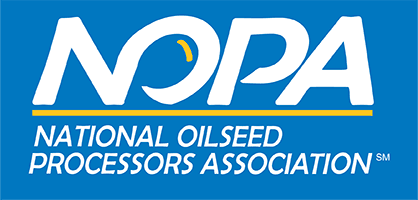NOPA and ASA Applaud Passage of “One, Big, Beautiful Bill,” Cementing Clean Fuel Credit Reforms that Prioritize U.S. Farmers
WASHINGTON, July 3, 2025 – The National Oilseed Processors Association (NOPA) and American Soybean Association (ASA) today praised the final passage of the One, Big, Beautiful Bill Act, transformative legislation that finalizes critical improvements to the 45Z Clean Fuel Production Credit. The reforms in this legislation represent a major win for the U.S. oilseed processing industry and the American farmers and rural communities it supports.
Passed by the Senate and House this week, and to be signed into law by President Trump on Independence Day, the legislation protects U.S. taxpayer resources by limiting eligibility for the 45Z credit to feedstocks grown and produced in North America. This critical provision disqualifies imports such as Chinese used cooking oil (UCO) and foreign tallow from receiving U.S. clean fuel tax incentives, helping ensure a level playing field for American-grown oilseeds like soy and canola.
“We applaud Congressional leaders for their work to improve this tax provision to ensure it is effective for U.S. farmers, oilseed processors and biofuel producers,” said Devin Mogler, President and CEO of NOPA. “Coupled with strong RVOs, this new tax policy positions the industry for continued growth by prioritizing feedstocks grown and produced here in the U.S.”
“ASA is pleased that the 45Z Clean Fuel Production Credit has been extended and strengthened in the budget reconciliation legislation,” said ASA President Caleb Ragland, a soybean farmer from Magnolia, KY. “The improvements to 45Z will provide critical support to U.S. soybean farmers and bolster the biofuel industry by supporting domestic energy production using domestic resources. The addition of the North American feedstock ringfence and removal of indirect land use change penalties on farmers ensure that the credit will support American agriculture rather than foreign countries. We commend the lawmakers who prioritized this important policy and look forward to its successful enactment.”
The legislation also removes the Indirect Land Use Change (ILUC) penalty, a long-standing barrier that relied on theoretical models rather than real-world emissions data. Eliminating ILUC allows soybean and canola-based biofuels to compete on a science-based, fairer emissions playing field. In addition, the credit was extended through 2029, providing greater investment certainty.
Since 2021, the U.S. soy crush industry has invested more than $6 billion into domestic processing infrastructure, expanding capacity by more than 25% in response to growing demand for advanced biofuels. The updated 45Z credit provides the long-term certainty needed to continue this growth and ensures that rural communities, not foreign supply chains, benefit from these investments.
###
Organized in 1930, the National Oilseed Processors Association (NOPA) represents the U.S. soybean, canola, flaxseed, safflower seed, and sunflower seed-crushing industries. NOPA’s membership is engaged in the processing of oilseeds for meal and oil that are utilized in the manufacturing of food, feed, renewable fuels, and industrial products. NOPA’s 19 member companies operate over 69 softseed and soybean solvent extraction plants across 20 states, crushing over 98% of all soybeans processed in the United States, the equivalent to more than 2 billion bushels annually. More information at www.NOPA.org.
The American Soybean Association (ASA) represents U.S. soybean farmers on domestic and international policy issues important to the soybean industry. ASA has 26 affiliated state associations representing 30 soybean-producing states and nearly 500,000 soybean farmers. More information at www.SOYGROWERS.org.
###

